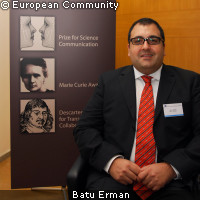Turkey celebrates first ever Marie Curie Excellence Award laureate
Batu Erman has been awarded one of the Marie Curie Excellence Awards, the first Turk to receive one of the prestigious prizes since they were established in 2003. Professor Erman left Turkey for the United States after secondary school to pursue a degree in biochemistry and molecular biology at a university in upstate New York. He was drawn there by the prospect of a liberal arts style education, which allowed him to follow courses in subjects like sociology and anthropology alongside biology. 'That kind of education was not possibly in Turkey at that time,' he told CORDIS News on 12 March, adding that the situation is different now, and that these kinds of courses 'greatly enhance the quality of education'. He did his PhD at Brandeis University in Massachusetts, before heading to the National Institutes of Health (NIH) to do his postdoctoral work. It was there that he started working on T cells, which play a vital role in our immune system. In 2004, after 17 years in the US, Professor Erman returned to his native Turkey, to take up a position at Sabanci University in Istanbul. His move was made possible by a Marie Curie Reintegration grant from the EU, plus a grant from the Turkish government. 'I always wanted to go back to Turkey but I felt like it would be difficult to do the kind of research that I do, but I guess I took a risk and the risk paid off,' he told CORDIS News. Since his move he has found that with a bit of imagination, he can still do top level experiments. 'I do things that are simpler to do and cheaper to do, because in the United States there's much more research funding and you can do very expensive, very cool, interesting high tech experiments,' he explained. 'But it's possible to do analogous experiments for much cheaper and this is the approach that I've taken and so far it's been working great.' His move was well timed. 'Right after I left the United States, the funding situation became really bad there,' he says. Over the past four years, he has succeeded in setting up a successful research programme in T-cell signalling and development. His work focuses on the receptors that control the development, survival and function of T lymphocytes known as 'killer T-cells'. When the signals go wrong, the cells survive and proliferate, resulting in diseases of the immune system. 'Our molecular biology research on T lymphocytes can be characterised as basic research with a view to developing drugs that target immunodeficiency diseases, lymphomas and leukaemia,' explains Professor Erman. 'Our aim is to find novel components of signal transduction pathways which can become targets for drugs.' His aim now is to produce 'some high visibility, high impact publications from this new scientific centre in the outer regions of the European Research Area'. Asked how he will spend his €50,000 prize, the professor replied that he hasn't really decided yet, but has several projects in mind. These include expanding his work with science fairs for schools and setting up an EU Researchers' Night event. And of course, some of the money will go towards the costs of running the lab. 'Research is very expensive,' he comments.
Countries
Türkiye, United States



